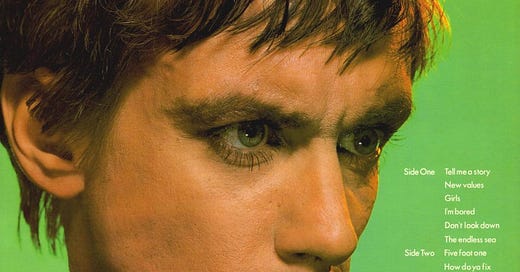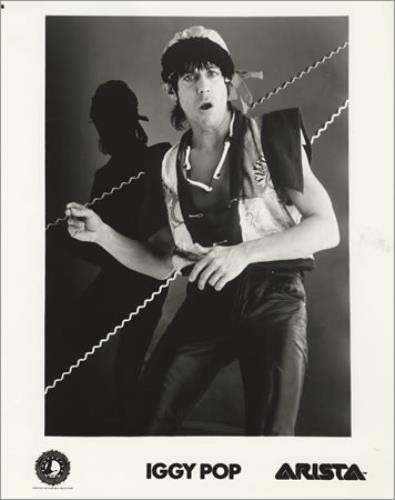Iggy Pop was pretty much down for the count at the time Arista signed him in 1978. When former Columbia Records exec and Arista founder Clive Davis was approached about signing Iggy to his fledgling label (remember, Columbia lost megabucks financing the recording, production, and re-production of the Stooges’ Raw Power) he pretty much said no dice.
According to Paul Trynka’s book Iggy Pop: Open Up and Bleed, Iggy was championed at Arista by A&R man Ben Edmonds (a former Creem writer) and Charles Levinson. There was just one problem with this: Edmonds was head of A&R for Arista UK and Levinson was in charge of Arista’s business arrangements outside the U.S. With Davis barely convinced to give recording Iggy a chance that left his chances of success in the U.S. somewhat in doubt.
But Iggy, working with former Stooges guitarist James Williamson (who doubled as producer, reprising his role in the Kill City sessions) talented former Stooges guitar player and keyboardist Scott Thurston, bassist Jackie Clark (formerly with Ike and Tina Turner), and drummer Klaus Kruger (an original member of Tangerine Dream who Bowie & Iggy knew from Berlin) honed a series of songs he’d been working on into one of his all-time best releases, New Values.
New Values
Though the sound of New Values is more polished and toned down than the Stooges, it bristles with a brattiness and sense of humor that is new for Iggy. “What must I do to take a holiday/Show me a bill that they can make me pay” he snorts at the opening of “Tell Me a Story”, and you know the champ is back in the ring.
“New Values” continues with a guitar riff and vocal-through-a-train-loudspeaker final vocal verse that reappeared on The Pretenders’ first album in “The Phone Call”. Some of the angular rhythms of punk are here, too, putting the Rolling Stones’ “Shattered” to shame–Iggy had been listening to the Stones’ Some Girls for inspiration while writing songs at home before his Arista signing.
Yep, this is pretty great stuff that no one had any expectation of Iggy pulling off back then. Both “Girls” and “I’m Bored” maintain a sense of humor that had never been present in Iggy’s work before. Two ballads, “Don’t Look Down” and “The Endless Sea” are beautiful, the latter maintaining some of the hypnotic energy of some of the Stooges’ work with infinitely more control. “Five Foot One”, an anthem of sorts, with its chant of “I wish life could be/Swedish magazines” is one of Iggy’s all-time best songs.
“I’m the chairman of the bored” Iggy sings in his best FM radio announcer voice, and you have to laugh. New Values was a hit in the UK, as was the single, “I’m Bored”, which Iggy performed on the Old Grey Whistle Test. Some radio stations (remember when there were still some independents out there) like WBCN in Boston started playing the album as an import. Once import sales were proving the album had an audience, Der Clive finally relented and released New Values in the U.S.a full six months after its British release. It went to 180 on the Billboard album chart, and soon it was available in cutout bins everywhere. But it clearly announced, to anyone who cared to listen, that Iggy was, musically, back in the land of the living.
And despite Clive Davis’ doubts, there was a definite feeling at Arista that New Values had primed the pump and another album was needed to put him over the top as a commercially viable act. Iggy had proven that he could write well, could focus and produce solid work without David Bowie’s assistance and was generally ready to assume the mantle of a more mature, and therefore saleable, artist.
Soldier
Iggy’s next outing, Soldier, featured an incredible band comprised of the Sex Pistols’ Glen Matlock, Barry Andrews (formerly of XTC and later of Shriekback), and Ivan Kral, who had played with the original Patti Smith Group. Also on hand was New Kids guitarist Steve New. The idea, that may have come from new A&R man Tarquin Gotch, who replaced Ben Edmonds, was to pair Iggy with some punk band mates in order to capitalize on both their energy and the rise of punk and the subsequent new wave music with college students.
Again, the material was top notch new Iggy stuff, and this time the performances had a harder edge with less finesse.”Loco Mosquito” announced his intentions (with delightful swirls of demented carnival organ from Andrews) whle ‘Em Down (In the City)” was like an outtake from Kill City.
“Dog Food” was pretty much a poke at punk (“I’m hangin’ round that same old scene/My girlfriend Betsy she’s just fourteen/There’s nothing better for me to do/I’m living on dog food!”), which Iggy was supposed to be the Godfather of. There were the diametrically opposed “I Need More” and “I’m a Conservative”, both of which displayed again Iggy’s wicked sense of humor, and Glen Matlock’s song “Ambition” in which he assumes the point of view of a gold digging female.
But the sessions that produced Soldier were a godawful mess, and the album reflects this messiness a bit. For one thing James Williamson, who had been tapped as producer again, was in a much weaker state after the making of New Values and the tour that had ensued. He had a strong sense of insecurity and feelings of distrust from previous work with Iggy, although the relative musical success of New Values had helped to calm those somewhat.
In addition, Clive Davis was monitoring the sessions pretty closely, via anxious phone calls to the A&R in charge of the project Julie Hooker. Julie thought the project showed a lot of promise and was inclined to allow things to continue, but it was difficult to cover the fact that the relationship between Iggy and Williamson was fraying at the edges.
According to multiple sources, it all came to a head when David Bowie came out to the remote studio where the group was recording in hopes of helping to smooth things out and assist his friend. Bowie provided some inspiration that seemed to get the group fired up again, but it was all too much for Williamson who flew into a rage at Bowie and at Iggy, quitting the project.
With Williamson out of the picture, there was some panic about salvaging the album from the sessions that had already been recorded. Pat Moran, a studio engineer was called upon to produce the remaining sessions and the album was pulled together. The guitar work of Steve New, who had also feuded with Bowie, was largely omitted from the album and one critique that is often leveled against Soldier is its lack of prominent guitar work.
Soldier gets a more mixed reception than New Values due to this messy quality, but honestly the songs are strong and there is plenty of solid music being played. I have to say that it’s a worthy followup to New Values, but once again it met with relative indifference in terms of sales, no one apparently caring that much that Iggy was able to pull together a second decent album pretty much on his own.
But all was not well in Pop-land. For one thing, Iggy’s old habits were coming back hard. There were plenty of drugs being consumed during the recording of Soldier and during subsequent live dates as well. This led to erratic and sometimes self-destructive behavior from Iggy.
It also led to lots of pressure from Arista. Iggy’s next recording for the label, everyone knew and many people said outright, was his last chance. So the one thing that mattered, the only thing that really mattered here, was that IGGY POP HAVE A BIG RADIO HIT.
Party
Spoiler Alert: Party was Pop’s last recording for Arista.
It is not as strong as the first two Arista albums because it sounds like what it is: a major attempt at getting radio airplay and, perhaps, a U.S. release of the album.
I saw Iggy live on tour after this album had just been released in Europe. He barely performed anything off of it (I remember him introducing “Pumpin’ For Jill” by saying his record company wouldn’t be bothering to release the album it was from in the U.S., not true) which could mean that he didn’t want to promote an album that the record company was burying.
Iggy’s writing partner for the album was Ivan Kral, of the Patti Smith Group. Kral was there, along with pianist Richard Sohl (also from Smith’s band), but both musicians were gone shortly after, replaced for the rest of the tour by Gary Valentine (ex-Blondie) and Carlos Alomar. There is a DVD of a performance from this tour, Live In San Fran 1981, recorded at the Warfield Theater.
In any case, this album is worth having only to complete the Arista trilogy. “Rock and Roll Party” and “Eggs on a Plate” are hilarious attacks on rock industry types, while “Houston Is Hot Tonight” wouldn’t sound out of place on Billy Idol’s first solo album. “Eggs On a Plate” would have been better had it been done by the bands on New Values or Soldier, but here it sounds tinny and more comic than punky.
But Pop really shone on the New Wave dance hit “Bang Bang”, a great song that Bowie later covered on Never Let Me Down and the subsequent Glass Spider Tour. It doesn’t get the sharp production that could have made it a big, international hit, but that’s part of the story of Iggy.
Anyway, after Party Iggy was at a low point again, without a label. He recorded Zombie Birdhouse in 1982 for Chris Stein’s label, with Stein producing, and the results were predictably uneven and weird.
It wasn’t until 1986 when Iggy, now signed to A&M Records, got back into the studio with David Bowie at the helm to produce an album that provided him with a great production and sound to go with his first rate writing, resulting in Blah Blah Blah, the album that eluded him at Arista.
New Values stands as essential Iggy for any collection, with Soldier not far behind.
New Directions in Music is written by a single real person. It is not generated by AI. Please help spread good content by reading (Thank you!) and sharing this post with a music loving friend. If you like what you see, please sign up for a free subscription so you don’t miss a thing, or sign up for a paid subscription if you can.






Hi Marshall: Interesting stuff. I was at CBS Records when "Raw Power" was released; my first job after college was there (1972-1974) writing and editing the house magazine Playback. If the marketing, sales, and promotion teams weren't enthusiastic about Springsteen's 1973 debut a month earlier, they really weren't crazy about Iggy. "Raw Power" had great songs but, as you hint at, no bottom, little audible bass. Bad mix, bad mastering. But at least Clive stuck with Iggy at Arista for three albums. He once explained to me (pre-Whitney) that having Barry Manilow and Kenny G. sell millions gave him the elasticity to sign Patti Smith, the then-commercially dubious Kinks, Iggy, Grateful Dead, and others. Also, "Lust for Life" on RCA 1977 showed Iggy's potential to make good records post-Columbia/pre-Arista. The drugs at the time didn't help.
Thanks for this!
I love those three albums SO MUCH!
I think these three are very much, witty, playful, fast and rocking. Very much Iggy.
You just gotta let loose and not take them seriously. They have brought me so much joy.